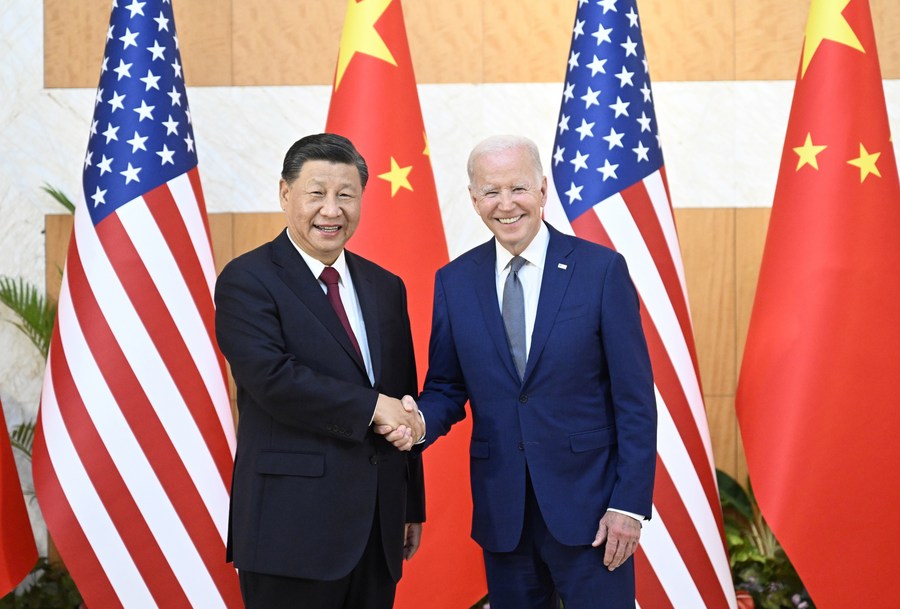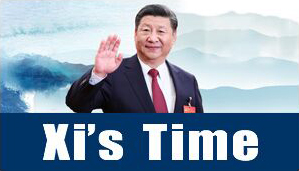
Chinese President Xi Jinping meets with U.S. President Joe Biden in Bali, Indonesia, Nov. 14, 2022. (Xinhua/Li Xueren)
BALI, Indonesia, Nov. 14 (Xinhua) -- Chinese President Xi Jinping and his U.S. counterpart, Joe Biden, had a candid and in-depth exchange of views here on Monday on issues of strategic importance in China-U.S. relations and on major global and regional issues.
The following are some of the highlights of their first in-person meeting since Biden became president of the United States.
PUT CHINA-U.S. TIES BACK ON TRACK
-- President Xi pointed out the current state of China-U.S. relations is not in the fundamental interests of the two countries and peoples, and is not what the international community expects. China and the United States need to have a sense of responsibility for history, for the world and for the people, explore the right way to get along with each other in the new era, put the relationship on the right course, and bring it back to the track of healthy and stable growth to the benefit of the two countries and the world as a whole.
OPEN, TRANSPARENT DOMESTIC, FOREIGN POLICIES
-- Xi pointed out that the domestic and foreign policies of the CPC and the Chinese government are open and transparent, with clearly stated and transparent strategic intentions and great continuity and stability.
-- Xi said China remains firm in pursuing an independent foreign policy of peace, always decides its position and attitude based on the merits of issues, and advocates resolving disputes peacefully through dialogue and consultation. China is committed to deepening and expanding global partnerships, safeguarding the international system with the United Nations at its core and the international order underpinned by international law, and building a community with a shared future for mankind.
-- China will stay committed to peaceful development, open development and win-win development, participate in and contribute to global development, and pursue common development with countries across the world, said Xi.
NOT ZERO-SUM GAME
-- Xi said China-U.S. relations should not be a zero-sum game where one side out-competes or thrives at the expense of the other. The successes of China and the United States are opportunities, not challenges, for each other. The world is big enough for the two countries to develop themselves and prosper together. The two sides should form a correct perception of each other's domestic and foreign policies and strategic intentions. China-U.S. interactions should be defined by dialogue and win-win cooperation, not confrontation and zero-sum competition.
-- The two sides should respect each other, coexist in peace, pursue win-win cooperation, and work together to ensure that China-U.S. relations move forward on the right course without losing direction or speed, still less having a collision, Xi added.
-- Xi said observing the basic norms of international relations and the three Sino-U.S. joint communiques is vitally important for the two sides to manage differences and disagreements and prevent confrontation and conflict; indeed, it is the most important guardrail and safety net for China-U.S. relations.
-- There is always competition in the world, but competition should be about learning from each other to become one's better self and make progress together, not about taking others down in a zero-sum game, he added.
FIRST RED LINE
-- Xi stressed that the Taiwan question is at the very core of China's core interests, the bedrock of the political foundation of China-U.S. relations, and the first red line that must not be crossed in China-U.S. relations.
-- Anyone that seeks to split Taiwan from China will be violating the fundamental interests of the Chinese nation; the Chinese people will absolutely not let that happen, he added.
HUMANITY'S COMMON PURSUIT
-- Xi noted that freedom, democracy and human rights are the common pursuit of humanity and also the unwavering pursuit of the CPC. Just as the United States has American-style democracy, China has Chinese-style democracy; both fit their respective national conditions. The whole-process people's democracy practiced in China is based on the country's reality, history and culture, and it reflects people's will. We take great pride in it.
-- Xi underscored that China and the United States are two major countries with different histories, cultures, social systems and development paths. There have been and will continue to be differences between the two countries. Such differences should not become an obstacle to growing China-U.S. relations.
GROWING COMMON INTERESTS
-- Xi said starting a trade war or a technology war, building walls and barriers, and pushing for decoupling and severing supply chains run counter to the principles of market economy and undermine international trade rules. Such attempts serve no one's interests.
-- We oppose politicizing and weaponizing economic and trade ties as well as exchanges in science and technology, he said.
-- Under the current circumstances, China and the United States share more, not less, common interests. It is in our mutual and fundamental interest to prevent conflict and confrontation and achieve peaceful coexistence. The two economies are deeply integrated, and both face new tasks in development. It is in our mutual interest to benefit from each other's development, Xi added.
SHARED RESPONSIBILITY FOR CONSTRUCTIVE TIES
-- President Biden congratulated Xi on his election as General Secretary of the CPC Central Committee. As two major countries, the United States and China have a responsibility to keep a constructive relationship.
-- Biden reaffirmed that a stable and prosperous China is good for the United States and the world. The United States respects China's system, and does not seek to change it. The United States does not seek a new Cold War, does not seek to revitalize alliances against China, does not support "Taiwan independence," does not support "two Chinas" or "one China, one Taiwan," and has no intention to have a conflict with China. The U.S. side has no intention to seek "de-coupling" from China, to halt China's economic development, or to contain China.
-- The U.S. government is committed to the one-China policy. It does not seek to use the Taiwan question as a tool to contain China, and hopes to see peace and stability across the Taiwan Strait, said Biden.
ON UKRAINE SITUATION
-- Xi said facing a global, composite crisis like the one in Ukraine, it is important to give serious thought to the following: first, conflicts and wars produce no winner; second, there is no simple solution to a complex issue; and third, confrontation between major countries must be avoided. China has all along stood on the side of peace and will continue to encourage peace talks. We support and look forward to a resumption of peace talks between Russia and Ukraine. At the same time, we hope that the United States, NATO and the EU will conduct comprehensive dialogues with Russia.
MAINTAIN REGULAR CONTACT
-- Both presidents viewed the meeting as in-depth, candid and constructive. They instructed their teams to promptly follow up and implement the important common understandings reached between them, and take concrete actions to put China-U.S. relations back on the track of steady development. The two presidents agreed to maintain regular contact. ■




